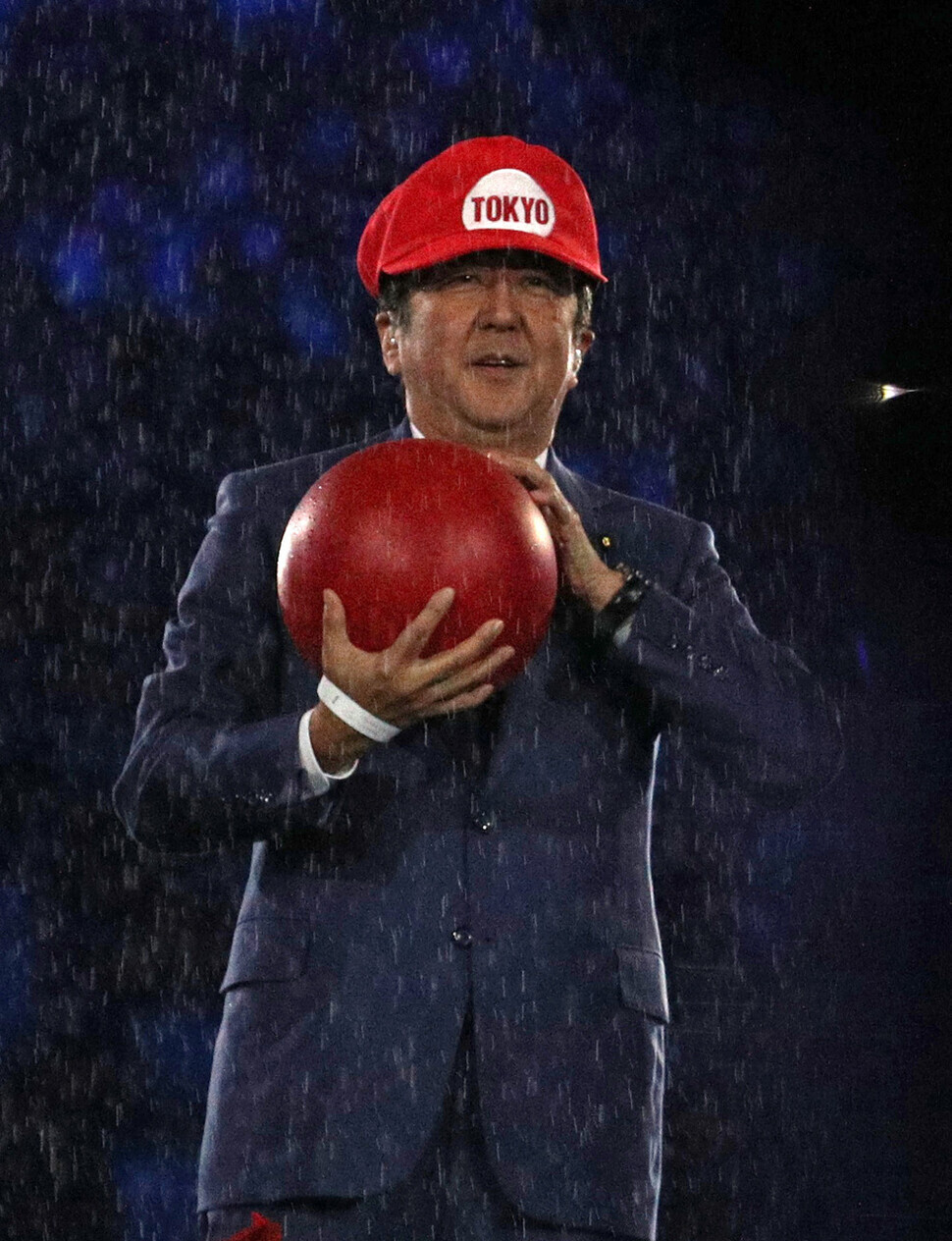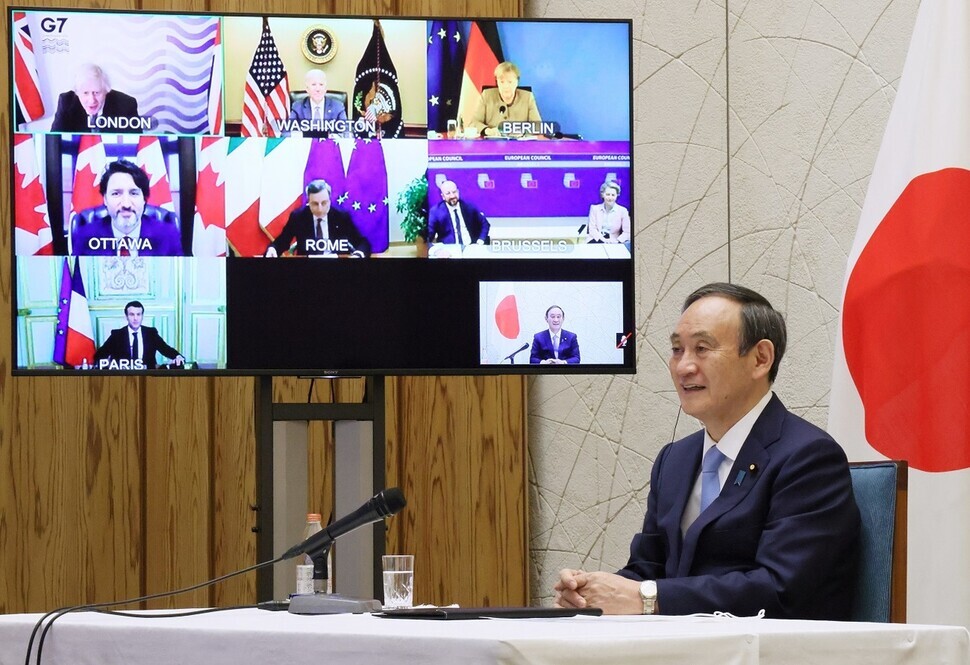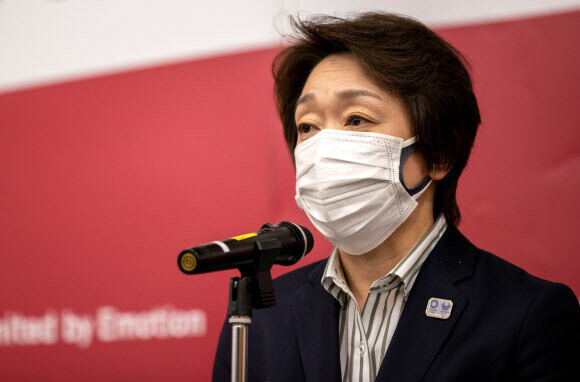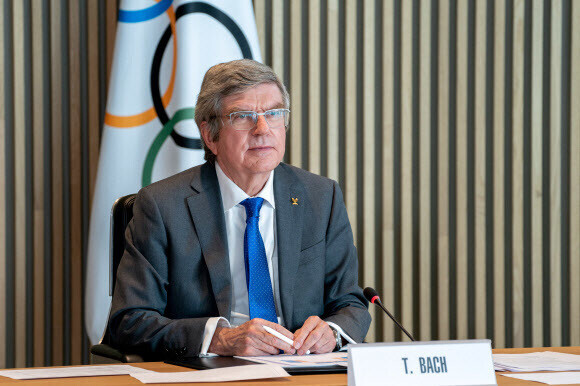hankyoreh
Links to other country sites 다른 나라 사이트 링크
Are the Tokyo Olympics really going to happen?

It seems certain that one of the variables that will have a major impact on the Korean Peninsula this year is whether the Summer Olympics are held in Tokyo this coming July as currently scheduled. After Japanese Prime Minister Yoshihide Suga assumed office in September 2020, South Korean President Moon Jae-in pledged to help ensure the success of the Tokyo Olympics as part of a proactive campaign to improve relations with Japan.
But because of the COVID-19 crisis and Japan’s stubborn insistence that South Korea must take the initiative in repairing relations, nothing came of tentative plans to hold a trilateral summit with China in 2020. The summit would have given Seoul and Tokyo a good chance to make up.
In South Korea, interest in the Tokyo Olympics has only risen since then. But in Japan, the issue of whether the Olympics will be held has emerged as a major controversy that has roiled domestic politics, along with Yoshiro Mori’s embarrassing resignation as president of the Tokyo Olympics organizing committee following a derogatory comment he made about women.
Given all the mishaps and commotion, then, it’s worth asking whether the Tokyo Olympics are going to be held at all. While nothing is for certain, it’s possible to predict that the Olympics will go ahead, provided that Japan doesn’t suffer a catastrophe on the scale of the Tohoku earthquake that struck Japan on March 11, 2011. There are three grounds for making this prediction, as I will explain below.

First, the Olympics has the support of major countries such as the US. The leaders of Japan and the other G7 countries convened for a virtual meeting on Feb. 19, their first since Joe Biden’s inauguration as US president.
“We support the commitment of Japan to hold the Olympic and Paralympic Games Tokyo 2020 in a safe and secure manner this summer as a symbol of global unity in overcoming COVID-19,” the leaders said in a joint statement released after their meeting.
That may explain why Suga looked more cheerful when he spoke to reporters following the meeting. “I feel very reassured to have secured the support [of the G7 leaders] for holding [the Olympics] with the goal of keeping the games safe and secure,” the Japanese Prime Minister said.
What’s so important about G7 support? To be sure, the Olympics are a festival for all humankind and a tribute to peace around the globe, but they’re also a business that operates according to a cold business calculus. G7 support for holding the Olympics means that athletes from those seven countries will participate in the games (assuming no unforeseen developments). That, in turn, means that the International Olympic Committee (IOC) can sell the Olympic broadcast rights to those countries at the expected high price.
Furthermore, if the G7 countries decide to compete in the Olympic Games, their global leadership means that other countries will have no choice but to compete as well. In short, G7 support means that Japan has cleared the steepest hurdle to hold the games.
Japan had been on tenterhooks about what position Biden would take on the Olympics, given how US society was thrown into chaos by COVID-19. Biden made his much-anticipated remarks on the Olympics on Feb. 7, when he said that the question of whether the Olympics can be safely held “has to be based on science,” adding that “I hope it’s possible, but it remains to be seen.”
“Imagine all those Olympians who work for four years, four years for one shot and all of a sudden that opportunity gets lost,” Biden said. “We are a science-driven administration; I think the rest of the world’s there too.”
“I’ve spoken with the prime minister of Japan; he’s working very hard to be in a position to safely open the Games […] but we have to do it based on the science. I hope we can play,” Biden said, offering a positive impression about holding the games. That impression was made explicit with G7 backing for holding the games on Feb. 19.

The second reason to think the games will go ahead is the political situation in Japan. Suga began his premiership in September 2020 with a high approval rating of 65% (according to the Asahi Shimbun), but as of February, his approval had plummeted to 35%, following his poor handling of the COVID-19 pandemic and a scandal in which his eldest son wined and dined officials at the communications ministry.
So far, Suga has managed to stay afloat, but failing to hold the Tokyo Olympics this year — which, after last year’s delay, would amount to its cancelation — would no doubt raise calls for him to step down. Suga became prime minister following the sudden resignation of Shinzo Abe in August 2020 through a delicate compromise between the major factions; he doesn’t have a strong base of his own.
When Suga’s response to COVID-19 proved ineffective, his administration started to waver. Hakubun Shimomura, chairman of the Policy Research Council of the Liberal Democratic Party (LDP), said during a television appearance on Jan. 5 that the LDP’s defeat in upcoming by-election in the Diet on April 25 could have political consequences. Shimomura was suggesting that Suga could face increasing pressure to resign from inside the LDP, his own party.
This eventuality is called the “Suga takedown.” But a few days later, on Jan. 13, Shimomura appeared to backpedal, declaring that he “would never try to take down Suga,” given his personal support for the current cabinet.
But the threat is still valid. If the Olympics are called off, leading politicians from other factions who have hitherto stayed silent will start working to take Suga down. Since Suga has to avoid such a situation, he’ll be forced to push ahead with the Olympics, despite the risks.
During the World Economic Forum on Jan. 29, Suga said that Japan is “holding the Olympics and Paralympics this summer […] as a proof of human victory against the pandemic.”

Finally, there’s the position of the IOC. In an interview in the Feb. 5 edition of Japanese newspaper the Nihon Keizai Shimbun, IOC vice president John Coates, an Australian, said there’s a “100 percent” likelihood of the Tokyo Olympics being held. Coates said there’s “no plan B” and that the games will go ahead despite the difficulties. He added that the athletes want to realize their dream of competing in the games.
In addition to being IOC vice president, Coates also chairs the IOC’s steering committee, which oversees preparations for the games. His comments suggest that the IOC supports holding the Olympics this year.
However, this year’s Olympics are likely to be rather different from what we’re accustomed to seeing. Over 10,000 athletes from more than 200 countries around the world compete in the Olympics.
Given differences in medical treatment and viral spread in those countries, it would be unreasonable to expect that everyone who comes to see the games will be vaccinated, even if the athletes are. (According to a guidebook for controlling infections published on Feb. 9, the IOC won’t require athletes to be vaccinated.) Under those circumstances, Japan can’t open its doors to people from around the world. The risk is just too great.
One option that’s being actively discussed in Japan is holding the events without any spectators. While Coates acknowledged that possibility, he said it would be wrong to make a decision before the vaccination situation has been confirmed. Coates added that the decision about whether to allow spectators to watch the games would be made in March or April.
That suggests that the IOC will decide whether audiences will be allowed into the events and, if so, how large the audiences can be in March at the earliest or in April at the latest after carefully reviewing the global administration of COVID-19 vaccines.
If the stadiums are left empty during the Olympics, the IOC’s estimated 90 billion yen (US$844.32 million) take from ticket sales will vanish into thin air. That would require another round of complex discussion between the IOC, the Japanese government, and the city of Tokyo about who will have to eat those losses.
In conclusion, the Olympics are likely to take place. The Olympic torch relay will begin on March 25, just one month from now, in Fukushima Prefecture, the area of Japan severely damaged by the Tohoku earthquake. The question of whether spectators will be allowed into Olympic events will be decided by April at the latest. And as long as there are no unexpected developments, Tokyo Olympics opening ceremony will be held as scheduled on July 23 — though audiences at the games may well be limited or banned altogether.
Initially, the Tokyo Olympics was planned to showcase the fortitude with which the Japanese overcame the Tohoku earthquake. But now, it has been redefined as an event showcasing the fortitude of humanity as it overcomes the COVID-19 pandemic.
That brings us to a question about the Korean Peninsula. Could the Tokyo Olympics serve as an opportunity to restart the Korean Peninsula peace process, just as the PyeongChang Winter Olympics did in February 2018, three years ago? Could there be a major diplomatic surprise during the games, such as a visit to Japan by North Korean leader Kim Jong-un or his sister Kim Yo-jong?
That’s something it wouldn’t be easy to predict. Neither the Japanese government nor the IOC can recreate the miracle of Pyeongchang. Only we Koreans can do that.
By Gil Yun-hyung, staff reporter
Please direct comments or questions to [english@hani.co.kr]

Editorial・opinion
![[Column] Samsung’s ‘lost decade’ and Lee Jae-yong’s mismatched chopsticks [Column] Samsung’s ‘lost decade’ and Lee Jae-yong’s mismatched chopsticks](https://flexible.img.hani.co.kr/flexible/normal/500/300/imgdb/original/2024/0512/3017154788490114.jpg) [Column] Samsung’s ‘lost decade’ and Lee Jae-yong’s mismatched chopsticks
[Column] Samsung’s ‘lost decade’ and Lee Jae-yong’s mismatched chopsticks![[Correspondent’s column] The real reason the US is worried about Chinese ‘overcapacity’ [Correspondent’s column] The real reason the US is worried about Chinese ‘overcapacity’](https://flexible.img.hani.co.kr/flexible/normal/500/300/imgdb/original/2024/0510/5217153290112576.jpg) [Correspondent’s column] The real reason the US is worried about Chinese ‘overcapacity’
[Correspondent’s column] The real reason the US is worried about Chinese ‘overcapacity’- [Editorial] Yoon’s gesture at communication only highlights his reluctance to change
- [Editorial] Perilous stakes of Trump’s rhetoric around US troop pullout from Korea
- [Guest essay] Preventing Korean Peninsula from becoming front line of new cold war
- [Column] The state is back — but is it in business?
- [Column] Life on our Trisolaris
- [Editorial] Penalties for airing allegations against Korea’s first lady endanger free press
- [Editorial] Yoon must halt procurement of SM-3 interceptor missiles
- [Guest essay] Maybe Korea’s rapid population decline is an opportunity, not a crisis
Most viewed articles
- 1[Column] Samsung’s ‘lost decade’ and Lee Jae-yong’s mismatched chopsticks
- 2Seoul’s plan to adopt SM-3 missiles is like wanting a sledgehammer to catch a fly
- 3[Correspondent’s column] The real reason the US is worried about Chinese ‘overcapacity’
- 4S.K.-Japan joint history project to be revived
- 5Yoon rejects calls for special counsel probes into Marine’s death, first lady in long-awaited presse
- 6With Naver’s inside director at Line gone, buyout negotiations appear to be well underway
- 7Korea poised to overtake Taiwan as world’s No. 2 chip producer by 2032
- 8[Book review] Who said Asians can’t make some good trouble?
- 9[Korea travels] Korea’s best stargazing spots put the Milky Way almost in reach
- 10S. Korean arrested and detained in Russia under espionage charges for first time in history, Moscow